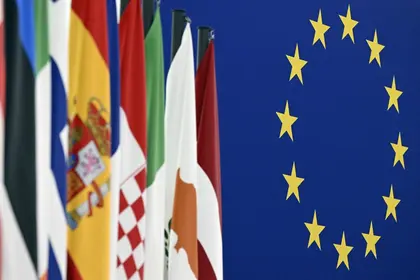The European Union, which earlier this month agreed to open formal membership negotiations with Ukraine and Moldova, has gone through several waves of expansion in the past 50 years.
European Council President Charles Michel, host of the last EU summit, said the bloc had also granted candidate status to Georgia, a step below opening membership talks, and would open negotiations with Bosnia once it meets membership criteria.
JOIN US ON TELEGRAM
Follow our coverage of the war on the @Kyivpost_official.
Ukrainian President Volodymyr Zelensky said the decision to open talks was a "victory for Ukraine", which has intensified its pleas for membership since Russia invaded in February 2022 launching an all-out war.
Moldova's President Maia Sandu said the decision opened a "new page".
Talks could take years or decades.
- Several enlargements, one departure -
Founded in 1957, the European Economic Community (later renamed the EU) started out with six members -- Belgium, France, Italy, Luxembourg, the Netherlands and West Germany.
In 1973, Britain, Denmark and Ireland joined, followed by Greece, Portugal and Spain in the 1980s.
In 1995, the bloc began expanding eastwards, admitting Austria, Finland and Sweden in a leap that gave it a shared border with Russia for the first time.
In 2004, came the "big bang" enlargement from 15 to 25 members, with eight ex-Communist Eastern European countries and two Mediterranean nations raising EU flags in one swoop.
In 2007, Bulgaria and Romania took the EU to 27 members and in 2013 Croatia became the 28th.

Eurotopics: Asylum - EU Summit Seeks Consensus
Britain became in 2020 the first member state to leave the EU, after a seismic 2016 referendum vote to quit the bloc, taking its members back down to 27.
- Growing waiting list -
The war in Ukraine has reignited the EU's drive to expand into central and eastern Europe.
In December 2022, Bosnia became the fifth Balkan nation to be given candidate status, following North Macedonia (2005), Montenegro (2010), Serbia (2012) and Albania (2014).
Kosovo in 2022 also applied but has yet to be given candidate status.
NATO member Turkey has been a candidate since 1999 and launched membership talks in 2005.
But Ankara's relations with the EU have deteriorated sharply since 2016 due in part to President Recep Tayyip Erdogan's crackdown on dissent in the wake of a failed coup.
For many EU member states, the long-stalled accession talks are dead in all but name. In September, Austria -- long opposed to Turkey's membership -- even called for the process to end.
Ukraine, whose European ambitions have fueled two revolutions since 2004, Moldova and Georgia brought to nine the number of countries in the EU's waiting room.
The three former Soviet republics were among six countries with which the EU formed an Eastern Partnership in 2009, trading closer economic and political ties for reforms.
The others were Armenia, Azerbaijan and Russia's ally Belarus, which later opted out.
- Years of negotiations -
Gaining full membership is a complex process which usually takes several years, as aspirants have to take on board the vast body of EU law.
While Finland was admitted in fewer than four years, it took the three ex-Soviet Baltic states of Estonia, Latvia and Lithuania nine.
You can also highlight the text and press Ctrl + Enter






